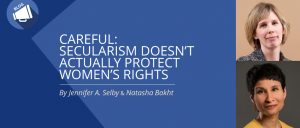 Three Reasons Why Canadians Should Know About Deepfakes Now
Three Reasons Why Canadians Should Know About Deepfakes Now
On September 5, 2019, Facebook’s current Chief Technology Officer Mike Schroepfer broke the news that the company will be participating in the launch of a challenge to detect deepfakes. What are “deepfakes”? You may have heard about them in the last two years because Nicolas Cage’s face has begun appearing in clips of movies and […]

 The Jury’s Own Voice
The Jury’s Own Voice Careful: Secularism Doesn’t Actually Protect Women’s Rights
Careful: Secularism Doesn’t Actually Protect Women’s Rights Principled Limitations? or Just Path Dependency?
Principled Limitations? or Just Path Dependency? Better Representation on Criminal Juries
Better Representation on Criminal Juries Mediation at the Court of Québec: Lessons Learned and a View into the Future
Mediation at the Court of Québec: Lessons Learned and a View into the Future Mediation at the Court of Appeal: Lessons Learned and a View into the Future
Mediation at the Court of Appeal: Lessons Learned and a View into the Future Judicial Mediation in Canada: An Inspiring Success Story
Judicial Mediation in Canada: An Inspiring Success Story Facilitation Conference in Criminal Matters: Advantages and Challenges
Facilitation Conference in Criminal Matters: Advantages and Challenges Judicial Courage: Myth or Reality?
Judicial Courage: Myth or Reality?